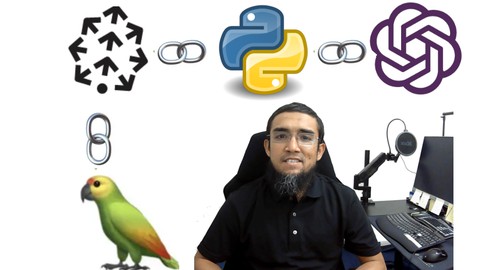
Master Vector Database with Python for AI & LLM Use Cases
Master Vector Database with Python for AI & LLM Use Cases, available at $79.99, has an average rating of 4.41, with 79 lectures, 5 quizzes, based on 703 reviews, and has 5646 subscribers.
You will learn about Pinecone Vector Database, LangChain, Transformer Models for vector embedding, Generative AI, Open AI API Usage, Hugging Face Models Master the essential techniques for vector data embedding, indexing, and retrieval. A Practical Code Along with Semantic Search Use Case in Detail with Named Entity Recognition Developing an AI Chat Bot for Cognitive Search on Private Data Using LangChain Understand the fundamentals of vector databases and their role in AI, generative AI, and LLM (Language Model Models). Explore various vector database technologies, including Pinecone, and learn how to set up and configure a vector database environment. Learn how vector databases enhance AI workflows by enabling efficient similarity search and nearest neighbor retrieval. Gain practical knowledge on integrating vector databases with Python, utilizing popular libraries like NumPy, Pandas, and scikit-learn. Implement code along exercises to build and optimize vector indexing systems for real-world applications. Explore practical use cases of vector databases in AI, generative AI, and LLM, such as recommendation systems, content generation, and language translation. Understand how vector databases can handle large-scale datasets and support real-time inference. Gain insights into performance optimization techniques, scalability considerations, and best practices for vector database implementation. This course is ideal for individuals who are Data engineers, database administrators and data professionals curious about the emerging field of vector databases. or Data scientists and analysts interested in exploring advanced AI techniques. or Machine learning engineers seeking to enhance their knowledge of vector databases and their applications. or AI researchers and practitioners looking to leverage vector databases for generative AI models. or Software developers interested in integrating vector databases into their applications. or Students and academics studying AI, machine learning, or data science who want to expand their knowledge in this specialized area. or Individuals with a technical background or a strong interest in AI and databases, eager to explore cutting-edge technologies shaping the future of AI and ML. It is particularly useful for Data engineers, database administrators and data professionals curious about the emerging field of vector databases. or Data scientists and analysts interested in exploring advanced AI techniques. or Machine learning engineers seeking to enhance their knowledge of vector databases and their applications. or AI researchers and practitioners looking to leverage vector databases for generative AI models. or Software developers interested in integrating vector databases into their applications. or Students and academics studying AI, machine learning, or data science who want to expand their knowledge in this specialized area. or Individuals with a technical background or a strong interest in AI and databases, eager to explore cutting-edge technologies shaping the future of AI and ML.
Enroll now: Master Vector Database with Python for AI & LLM Use Cases
Summary
Title: Master Vector Database with Python for AI & LLM Use Cases
Price: $79.99
Average Rating: 4.41
Number of Lectures: 79
Number of Quizzes: 5
Number of Published Lectures: 64
Number of Published Quizzes: 5
Number of Curriculum Items: 86
Number of Published Curriculum Objects: 71
Original Price: $19.99
Quality Status: approved
Status: Live
What You Will Learn
- Pinecone Vector Database, LangChain, Transformer Models for vector embedding, Generative AI, Open AI API Usage, Hugging Face Models
- Master the essential techniques for vector data embedding, indexing, and retrieval.
- A Practical Code Along with Semantic Search Use Case in Detail with Named Entity Recognition
- Developing an AI Chat Bot for Cognitive Search on Private Data Using LangChain
- Understand the fundamentals of vector databases and their role in AI, generative AI, and LLM (Language Model Models).
- Explore various vector database technologies, including Pinecone, and learn how to set up and configure a vector database environment.
- Learn how vector databases enhance AI workflows by enabling efficient similarity search and nearest neighbor retrieval.
- Gain practical knowledge on integrating vector databases with Python, utilizing popular libraries like NumPy, Pandas, and scikit-learn.
- Implement code along exercises to build and optimize vector indexing systems for real-world applications.
- Explore practical use cases of vector databases in AI, generative AI, and LLM, such as recommendation systems, content generation, and language translation.
- Understand how vector databases can handle large-scale datasets and support real-time inference.
- Gain insights into performance optimization techniques, scalability considerations, and best practices for vector database implementation.
Who Should Attend
- Data engineers, database administrators and data professionals curious about the emerging field of vector databases.
- Data scientists and analysts interested in exploring advanced AI techniques.
- Machine learning engineers seeking to enhance their knowledge of vector databases and their applications.
- AI researchers and practitioners looking to leverage vector databases for generative AI models.
- Software developers interested in integrating vector databases into their applications.
- Students and academics studying AI, machine learning, or data science who want to expand their knowledge in this specialized area.
- Individuals with a technical background or a strong interest in AI and databases, eager to explore cutting-edge technologies shaping the future of AI and ML.
Target Audiences
- Data engineers, database administrators and data professionals curious about the emerging field of vector databases.
- Data scientists and analysts interested in exploring advanced AI techniques.
- Machine learning engineers seeking to enhance their knowledge of vector databases and their applications.
- AI researchers and practitioners looking to leverage vector databases for generative AI models.
- Software developers interested in integrating vector databases into their applications.
- Students and academics studying AI, machine learning, or data science who want to expand their knowledge in this specialized area.
- Individuals with a technical background or a strong interest in AI and databases, eager to explore cutting-edge technologies shaping the future of AI and ML.
In this comprehensive course on Vector Databases, you will delve into the exciting world of cutting-edge technologies that are transforming the field of artificial intelligence (AI), particularly in generative AI. With a focus on Future-Proofing Generative AI, this course will equip you with the knowledge and skills to harness the power of Vector Databases for advanced applications, including Language Model Models (LLM), Generative Pretrained Transformers (GPT) like ChatGPT, and Artificial General Intelligence (AGI) development.
Starting from the foundations, you will learn the fundamentals of Vector Databases and their role in revolutionizing AI workflows. Through practical examples and hands-on coding exercises, you will explore techniques such as vector data indexing, storage, retrieval, and conditionality reduction. You will also gain proficiency in integrating Pinecone Vector Data Base with other tools like LangChain, OpenAI API using Python to implement real-world use cases and unleash the full potential of Vector Databases.
Throughout the course, we will uncover the limitless possibilities of Vector Databases in generative AI. You will discover how these databases enable content generation, recommendation systems, language translation, and more. Additionally, we will discuss performance optimization, scalability considerations, and best practices for efficient implementation.
Led by an expert instructor with a PhD in computational nano science and extensive experience as a data scientist at leading companies, you will benefit from their deep knowledge, practical insights, and passion for teaching AI and Machine Learning (ML). Join us now to embark on this transformative learning journey and position yourself at the forefront of Future-Proofing Generative AI with Vector Databases. Enroll today and unlock a world of AI innovation!
Course Curriculum
Chapter 1: Introduction to Vector Database
Lecture 1: Course Overview
Lecture 2: Introduction to Vector Database
Lecture 3: Why Vector Database
Lecture 4: Vector Database Use Cases
Chapter 2: Vector Database Foundations
Lecture 1: Section Overview
Lecture 2: Fundamentals of Vector Database
Lecture 3: SQLite Database
Lecture 4: Storing and Retrieving Vector Data in SQLite
Lecture 5: Vector Similarity Search
Lecture 6: Chroma DB-Local Vector Data Base – Part 1: Setup & Data Insertion
Lecture 7: Chroma DB-Local Vector Data Base – Part 2: Query
Chapter 3: Pinecone Vector Database Environment Setup
Lecture 1: Pinecone Account Setup
Lecture 2: Pinecone DB Console Overview
Lecture 3: Setting Up Development Environment in Windows
Lecture 4: Setting Up Development Environment in Ubuntu
Lecture 5: "Hello World" Script for Vector DB
Chapter 4: Database Operations
Lecture 1: Database Operations: Create, Retrieve, Update and Deletion (CRUD)
Lecture 2: Insert Data
Lecture 3: Upsert: Insert and Update
Lecture 4: Query Vector Data
Lecture 5: Fetch Vectors by ID
Lecture 6: Delete Vector
Chapter 5: Data Base Management
Lecture 1: Concepts of Index and Collection
Lecture 2: Index Management
Lecture 3: Partitioning Vectors
Lecture 4: Upsert using Namespace
Lecture 5: Vector Partitioning Using Metadata
Lecture 6: Distance Metrics
Chapter 6: Project 1: Application in Semantic Search
Lecture 1: Introduction to Semantic Search
Lecture 2: Medium Posts Data Obtaining
Lecture 3: Data Preprocessing
Lecture 4: Preparing for Upsert
Lecture 5: Vector Query: "Semantic Search"
Chapter 7: Project 2: Semantic Search Powered by Named Entity
Lecture 1: Concept of Named Entity Recognition (NER)
Lecture 2: NER Implementation Examples
Lecture 3: Setting up Environment for NER based Semantic Search
Lecture 4: Vector Embedding Models and Load Data
Lecture 5: Data Preparation
Lecture 6: Developing NER Helper Function
Lecture 7: Vector Embedding in Batches
Lecture 8: NER Extraction in Batches
Lecture 9: Metadata Processing
Lecture 10: Vector Upsert
Lecture 11: Vector Query: Semantic Search with NER
Chapter 8: Project 3: Building AI Chat Agent with LangChain and OpenAI
Lecture 1: Building an Retrieval AI Agent with LangChain and OpenAI
Lecture 2: Obtaining OpenAI API
Lecture 3: Data Load
Lecture 4: Vector Embedding Function
Lecture 5: Setup Vector DB
Lecture 6: Processing for Meta Data
Lecture 7: Embedding and OpenAI Rate Limit Workaround
Lecture 8: Indexing
Lecture 9: Semantic Search with OpenAI
Lecture 10: Embedding with OpenAI and LangChain
Lecture 11: Retrieval QA Agent- an example of retrieval augmented generation (RAG)
Lecture 12: Chat Agent
Chapter 9: Project 4: Audio Similarity Search
Lecture 1: Environment Setup
Lecture 2: Loading Audio Data
Lecture 3: Exploring Audio Data
Lecture 4: Embedding Audio Data
Lecture 5: Setting up Vector Database for Audio
Lecture 6: Vector Indexing
Lecture 7: Vector Querying
Lecture 8: Audio Search with your Own Data: Out of sample search
Chapter 10: Project 5: Capstone
Instructors
-
Dr. KM Mohsin
Data Scientist, Computational Scientist: Nano-Electronics
Rating Distribution
- 1 stars: 13 votes
- 2 stars: 19 votes
- 3 stars: 88 votes
- 4 stars: 249 votes
- 5 stars: 340 votes
Frequently Asked Questions
How long do I have access to the course materials?
You can view and review the lecture materials indefinitely, like an on-demand channel.
Can I take my courses with me wherever I go?
Definitely! If you have an internet connection, courses on Udemy are available on any device at any time. If you don’t have an internet connection, some instructors also let their students download course lectures. That’s up to the instructor though, so make sure you get on their good side!
You may also like
- Top 10 Content Creation Courses to Learn in December 2024
- Top 10 Game Development Courses to Learn in December 2024
- Top 10 Software Testing Courses to Learn in December 2024
- Top 10 Big Data Courses to Learn in December 2024
- Top 10 Internet Of Things Courses to Learn in December 2024
- Top 10 Quantum Computing Courses to Learn in December 2024
- Top 10 Cloud Computing Courses to Learn in December 2024
- Top 10 3d Modeling Courses to Learn in December 2024
- Top 10 Mobile App Development Courses to Learn in December 2024
- Top 10 Graphic Design Courses to Learn in December 2024
- Top 10 Videography Courses to Learn in December 2024
- Top 10 Photography Courses to Learn in December 2024
- Top 10 Language Learning Courses to Learn in December 2024
- Top 10 Product Management Courses to Learn in December 2024
- Top 10 Investing Courses to Learn in December 2024
- Top 10 Personal Finance Courses to Learn in December 2024
- Top 10 Health And Wellness Courses to Learn in December 2024
- Top 10 Chatgpt And Ai Tools Courses to Learn in December 2024
- Top 10 Virtual Reality Courses to Learn in December 2024
- Top 10 Augmented Reality Courses to Learn in December 2024






















